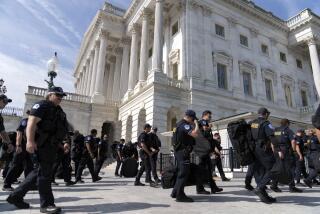Israeli Nukes Roar Into the Spotlight
- Share via
JERUSALEM — Another taboo was shattered in Israel on Wednesday, and quite noisily at that, when parliament held its first-ever public debate on something that is rarely admitted to exist: Israel’s top-secret nuclear arsenal.
The issue was forced onto the agenda by an Arab Israeli member of parliament, who was promptly attacked for his efforts.
Jewish politicians from across the political spectrum stormed out of the Knesset, or parliament, as Issam Mahoul of the communist Hadash Party opened the debate with complaints that Israel maintains a “stockpile of atomic, chemical and biological weapons” that risks “a mini-Chernobyl.”
A government minister, Haim Ramon, responded that Mahoul was “talking nonsense,” and the debate deteriorated into a raucous shouting match. Six Knesset members--five Arabs and one Jew--were ejected.
Still, the session was aired live on television and marked another step in public discussion of the open secrets surrounding Israel’s nuclear capability.
Israel has maintained a policy of “ambiguity” that neither denies nor confirms the existence of what most foreign experts say is an extensive nuclear weapons program based in Dimona, in the Negev desert.
Mordechai Vanunu, a former technician at Dimona, has languished in prison for revealing secrets of Israel’s nuclear industry to the Sunday Times of London in 1986. More recently, however, Israel has begun to loosen up a bit on disclosing the truth. Two months ago, the government allowed an Israeli newspaper to publish portions of the classified transcript of Vanunu’s trial.
And Wednesday, the Knesset leadership allowed Mahoul’s petition to open a public debate on the chamber floor--not that anyone heard much of what was being said.
Mahoul began by saying that the Israeli government was long overdue to talk openly about the range of its nuclear assets and to allow more civilian oversight. He charged that the country is in danger of becoming a “nuclear waste dump” because of lax controls and inadequate monitoring.
“The dangers exist not only during war, but also without war because of the nuclear mountain piling at our door which can affect the environment, the water sources and our very existence,” Mahoul said over jeers and heckling.
“The thing we believe to be Israel’s source of security could become the greatest threat to Israelis’ security,” he said.
As Mahoul stepped away from the podium, his arms flailing at Knesset members who continued to shout at him, Ramon stood to respond on behalf of the government.
Ramon, the minister in charge of Jerusalem affairs for Prime Minister Ehud Barak, said Israel could ill afford to reveal its secrets to countries such as Iran that continue to advocate the destruction of the Jewish state.
“Issues such as the scope of [weapon] capabilities, policies and modes of defense are not discussed in any parliament anywhere in the world,” Ramon said. “You suggest that this issue be made public? Why stop there? There are many other secrets imperative to our existence. Do you suggest we expose them all?”
The brouhaha split the Knesset along ethnic lines. Some of the Jewish lawmakers accused Mahoul of working as a fifth column; Arab Knesset members responded by hectoring Ramon. Five of the Knesset’s 12 Arab members were thrown out of the session, including one who had to be removed physically.
Ramon repeated the long-standing official position that Israel will not be the first to introduce nuclear weapons into the Middle East. But Israel has also declined to sign the Nuclear Non-Proliferation Treaty and refuses to submit to international inspections, much to the anger of Egypt and other Arab neighbors.
“Israel supports the idea that the Middle East should be free of nuclear weapons when there is no longer a threat of war,” Ramon said.
Mahoul, in an interview after the emotional Knesset session ended, said he felt he had made his point. “We are breaking through the wall of silence surrounding nuclear issues in Israel,” he said. “This was historical. And it was hysterical.”
More to Read
Sign up for Essential California
The most important California stories and recommendations in your inbox every morning.
You may occasionally receive promotional content from the Los Angeles Times.














